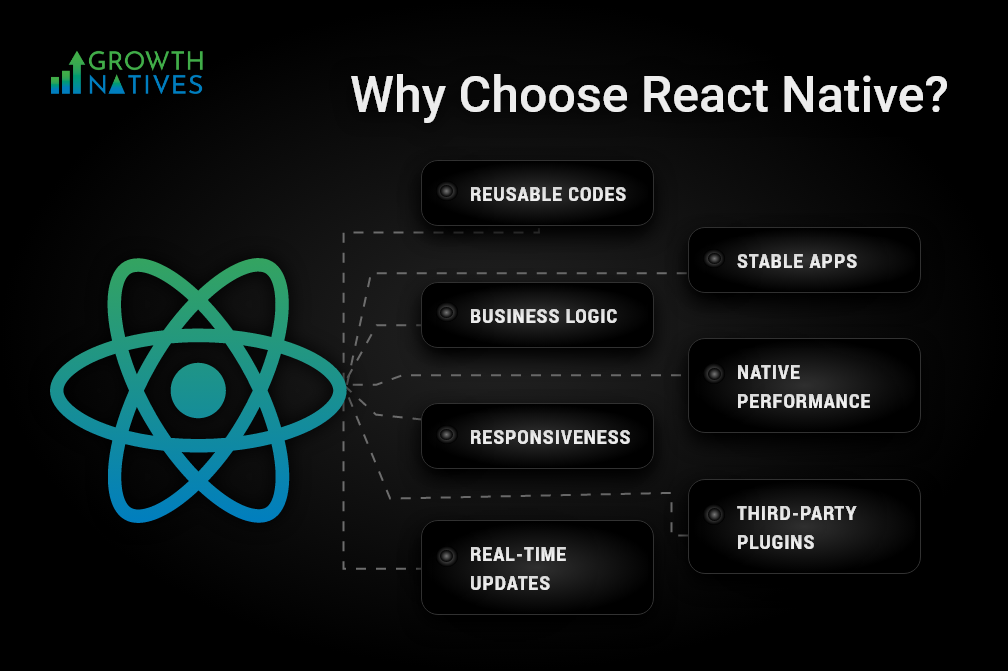
Why You Should Choose React Native for Your Business
By Sakshi Arora
Jul 14, 20225 min read
You are well aware of the fact that the mobile app market has grown multifold over the last decade. The launch of the iPhone back in 2007 and that of Android OS a couple of years later marked a major inflection point in the world of technology. It changed the way businesses interact with their customers.
Today, mobile applications act as the bridge between consumers and organizations. From $177 billion in 2017, the revenue from mobile apps is expected to touch $469 billion by the end of 2022 and $613 billion by 2025. You can’t afford to not have mobile applications anymore; they are as important as having a website.
As businesses have been competing for a share of this fast-growing market, a small dilemma has always accompanied their projects. Should they opt for a native app or go for cross-platform development? Building native apps for Android and iOS is both time-consuming and requires immense resources. Cross-platform apps offer a faster, easier, and cheaper alternative to building apps for both the platforms.
However, cross-platform apps have always been plagued by inferior performance as compared to native apps. Cross-platform apps historically had a longer wait time for new features and needed complex code designs. React Native breathed fresh life into cross-platform development and lets you develop apps for Android and iOS platforms simultaneously.
What Is React Native?
React Native has its origins in Facebook where it used JavaScriptCore runtime and Babel transformers that leveraged native UI elements to overcome the limitations of HTML5. The greatest USP of React Native was its ability to synergize business logic and flow control of JavaScript. Since then, it has become one of the favorite tools for mobile app developers working on cross-platform projects. It allows them to build responsive and flexible cross-platform apps that deliver the same experience as native apps.
Is React Native Worth It?
This is another dilemma that many developers face when choosing React Native for cross-platform development. Though we have the likes of Facebook, Instagram, Skype, and Walmart, and dozens of other Fortune 500 companies sing laurels for this technology, there are naysayers too who have shared their bad experiences where they failed to achieve the expected level of cross-platform integration.
Yet, an objective study suggests that yea-sayers would outnumber the naysayers by a huge majority both in absolute numbers and the volume of business they generate.
Why Choose React Native?
If you have a cross-platform app development project in mind, React Native would be your best bet. It commands 42% of the market share in the cross-platform app development market, making it the first choice tool for developers.
Though it does have its limitations vis-à-vis app performance when compared to native apps, it is surely the best option you have if you are thinking cross-platform. Here are a few reasons why you should opt for React Native:

1. Reusable Codes
This is the primary reason developers love React Native. With this tool, developers can reuse as much as 90% of the codes across native and cross-platform apps. It helps reduce the time to market for the apps and also brings down the development costs.
2. Business logic
React Native has JavaScript at its core, which is used both for the business logic as well as for optimizing the native UI layers. This is beneficial during development as you can easily apply the same app logic across both Android and iOS platforms, offering a unified user experience. Hence, users are unlikely to feel the difference using the apps if they switch from one platform to the other.
3. Responsiveness
In any business application, responsiveness is one of the key factors for its popularity among users. This is one area where React Native scores highly as it lets developers build user-friendly business apps.
4. Native Performance
The core objective of cross-platform app development is to achieve native performance or get as close to it as possible. React Native is best in this regard when compared with other app development tools. Apps developed in this platform report higher performance, elimination of compatibility issues, and smooth animations.
5. Real-Time Updates
React Native has the Live Reload feature using which developers can implement changes to the code and view these changes in real time. You can spot and fix errors and bugs easily while the app is loading. This feature also allows you to reload a particular part of the app and make any changes.
6. Third-Party Plugins
As it is based on JavaScript, React Native allows easy integration of third-party plugins. This feature also extends to native modules. It helps achieve advanced features and functionalities on the apps without having to reinvent the wheel.
7. Stable Apps
You won’t trade the stability of your apps for anything else and React Native helps in building apps that are stable on both the platforms. It simplifies the process of data binding, which makes your app stable even as they are put through upgrades in the future.
Final Thoughts
Cross-platform app development has its challenges as these apps still fall short on performance and on leveraging the hardware of devices. However, with tools such as React Native, these apps have been narrowing this gap.
An experienced development team can overcome the performance challenges in cross-platform apps with ingenuity and a well-thought-out approach. Thus, if you are undertaking a cross-platform app development project, React Native is your best bet at the moment.
If you are looking for React Native experts who can build the best cross-platform apps, Growth Natives can help. Apart from minimizing your cost, we also promise the fastest time-to-market for your app. We love solving business problems and backing up our development with reliable post-development support and maintenance. Book a free consultation with our team by dropping an email at info@growthnatives.com.




